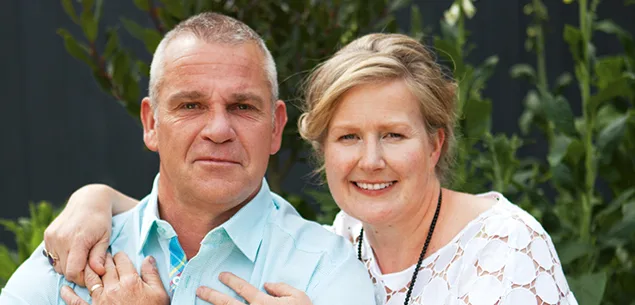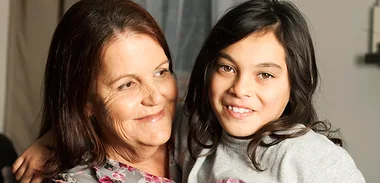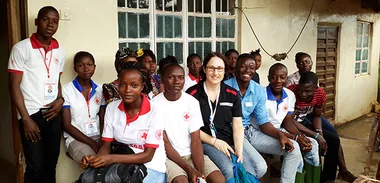Royce Brewer is a complex man with one simple dream – to live a healthy and fulfilled life with his new wife and three adult sons.
But first, the Rangiora bricklayer must raise $100,000 to travel to Russia for ground-breaking stem cell transplantation surgery, which promises to halt the rate of his debilitating Multiple Sclerosis (MS).
Royce’s MS is progressive and increasing in severity every year. And, like many sufferers, he could end up spending the rest of his life in a wheelchair, experience cognitive and memory decline, and eventually die from MS-related complications.
With the support of his loving wife Gabby, whom he wed in April, Royce is on a crusade to raise enough money so he can travel to Moscow in 2016 for a Hematopoietic Stem Cell Transplantation (HSCT).
HSCT is a controversial treatment that some medical experts say can help stop MS in its tracks and halt further progression.
Royce (45) is one of the first Kiwis to be accepted for HSCT in Russia. During the treatment, his bone marrow will be removed, so that stem cells from the blood can be collected. The cells are then stored or frozen before being returned to the blood stream.
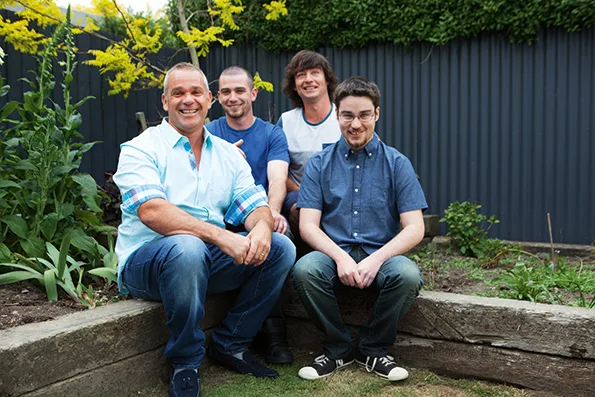
Royce with his boys (from left): Nick, Shaun and Ben.
Talking about the potentially life-saving treatment causes Royce to well up with tears of gratitude. Royce found out he had MS when he was just 21. It was a diagnosis that came as a complete shock to the usually healthy, sporty young man.
“I was in the first XV and top of athletics at school. Then I started work as a bricklayer. I started suffering from dizziness and would sometimes fall over and slur my speech. I tried not to let it affect me, but when I got to my thirties, I started getting very fatigued,” he explains.
These days, Royce says if he tried to walk three kilometres “I’d be in bed for three days.” He gets dizzy just moving from his lounge to his kitchen.
“My head feels swollen and intense, I have blurry vision and my right side is paralysed. I fall over at least once every day,” says Royce, whose health also deteriorated after the stress of Christchurch’s earthquakes. “I work part-time now and only on my knees, because I can’t stand up properly.”
Father to Nick (23), Shaun (21) and Ben (20), sons from his previous relationship, Royce is hoping HSCT will help him regain mobility and give him at least another 10 years.
“I can’t wait! If I could go to Russia tomorrow, I would,” he tells. “I’m confident that once I get this treatment, my symptoms will stop. I’ve always told Gabby that we’ll not have the opportunity to grow old together. But now, knowing there might be a solution, I’m able to think further ahead.”
Gabby (42), who met Royce through a mutual friend, says their whirlwind romance saw them engaged within three months and married within their first year together. “He had me at hello,” she smiles. “I just knew he was ‘the one’.”
Royce was honest about his MS from the start, but Gabby says she never saw it as an obstacle to their relationship.
“He gave me MS brochures and said, ‘This is me.’ He told me his condition would get worse over time. I read the information and kept saying there might be a magic pill – we don’t know what discoveries are around the corner,” says Gabby.
Life has been far from easy for the head-over-heels couple. For those with MS, medication is expensive and not always government funded. Royce has spent his adult life choosing not to spend the $2000 it costs each month to ease the symptoms. “I tried taking intense medication when I was younger, but it didn’t help, so I stopped 10 years ago.”
Then, earlier this year, hope came in the form of a 60 Minutes story featuring Australian mum Kristy Cruise, who, at 37, underwent HSCT in Russia and found the procedure radically enhanced her life.
Kristy could barely walk before the treatment, but six months afterwards gained back full mobility, which she believes is down to HSCT. Her story was just one of hundreds that Royce and Gabby were moved by after researching the possible benefits of the treatment.
Although HSCT treatment, is not endorsed by medical experts here – it’s deemed experimental and untested – Gabby and Royce were convinced it was the solution they’d been searching for.
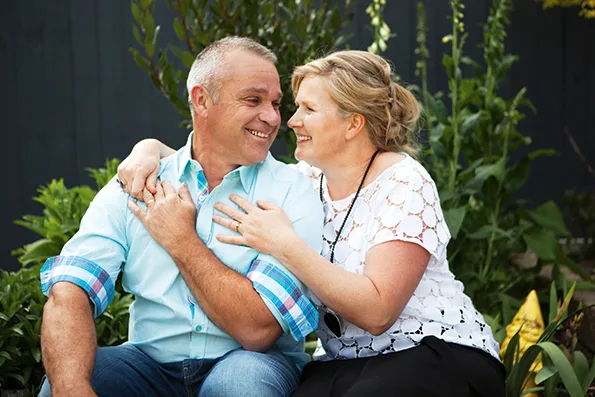
Royce and Gabby tied the knot in the garden of a Lincoln property they rented in April this year.
“Kristy’s story changed our lives and gave us massive hope,” explains Gabby.
But the couple are uncertain how they’ll raise the money they need for the treatment. There’s $15,800 in the bank so far, but they have a long way to go.
“I struggle with taking donations as I’ve always earned my own money and looked after myself,” says Royce. “But I will sell our house if we have to. MS is a terrible thing – my mind is okay, but my body and nervous system are buggered.”
WHAT IS MS?
Multiple sclerosis is a disorder of the central nervous system that interferes with signals between the brain, spinal cord and parts of the body. Around one in every 1000 Kiwis are sufferers of the neurological disease, with almost three times as many women diagnosed as men. There is currently no cure for MS. For more info, visit msnz.org.nz
THE HSCT CONTROVERSY
Hematopoietic stem cell transplantation was first used in 1995 to treat patients with severe MS. It’s offered in some countries (not New Zealand)as an alternative treatment option for aggressive multiple sclerosis. HSCT is not widely accepted for MS use, due to the limited information and studies on patients treated with it to date. Many patients have a remitting/relapsing form of MS and some experts warn HSCT may pose more risks than long-term benefits.
**HELP ROYCE
**To donate, visit givealittle.co.nz/cause/RoyceBrewer or go to Royce’s website at royce2russia.nz
